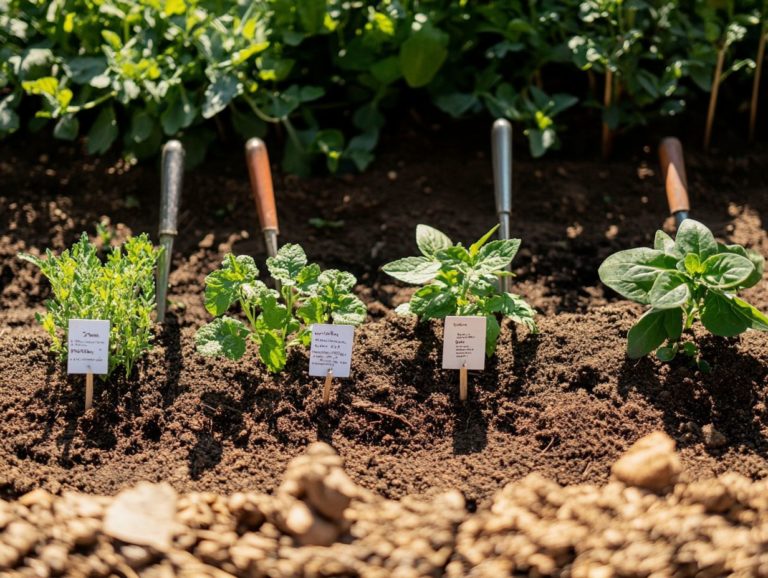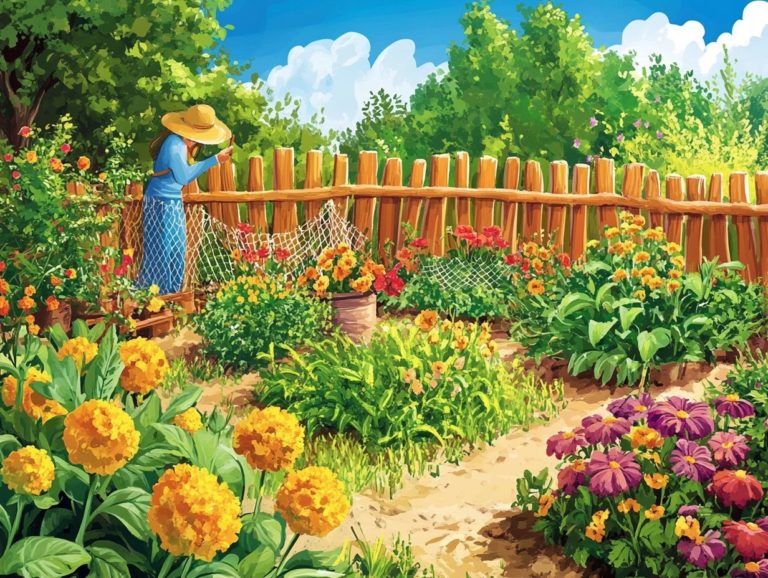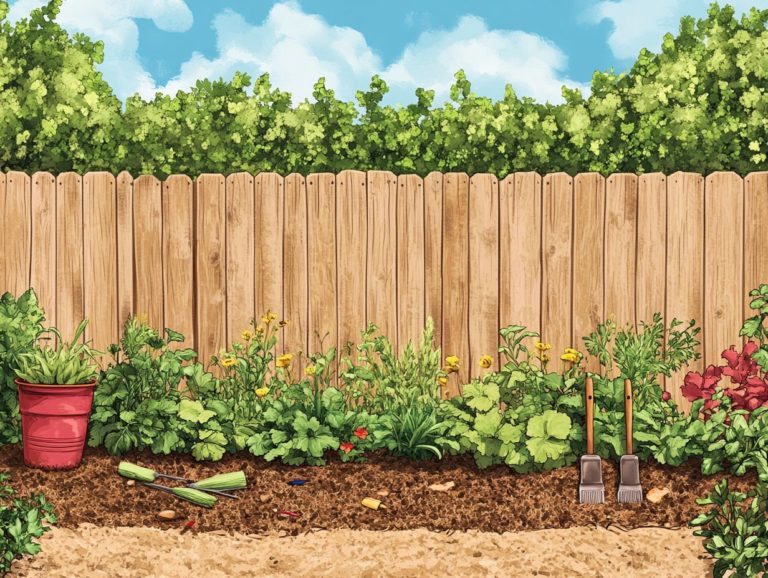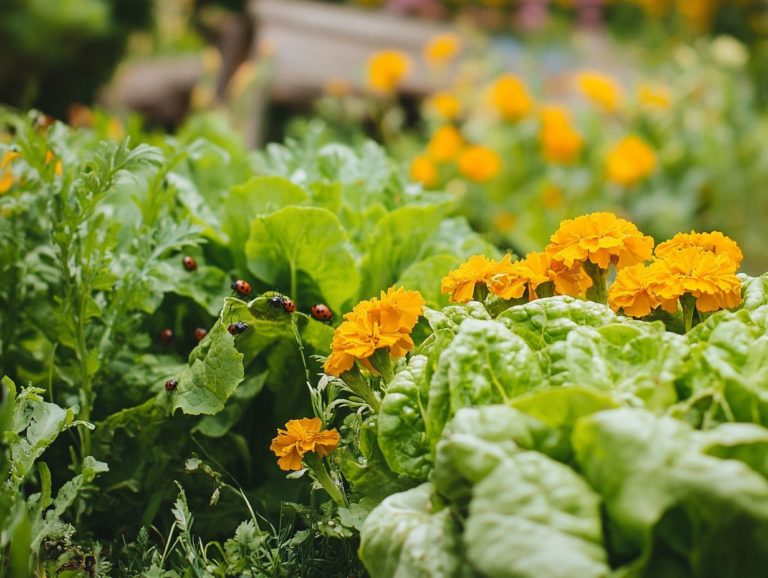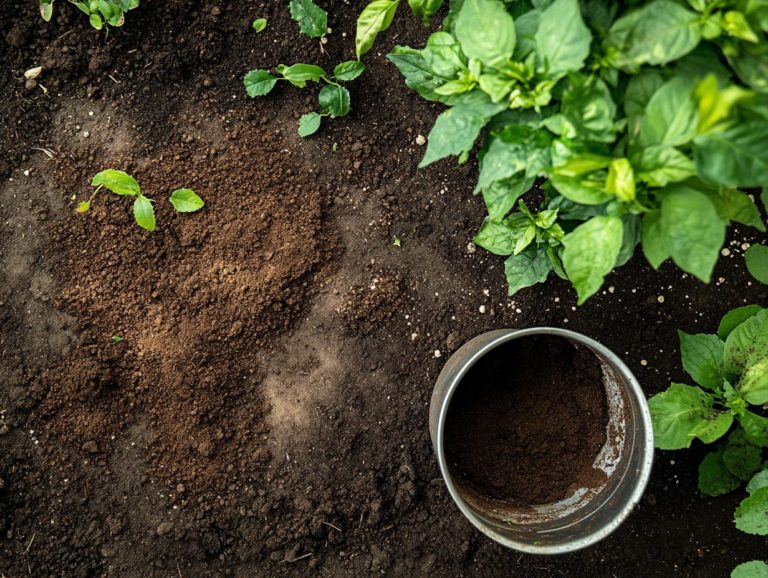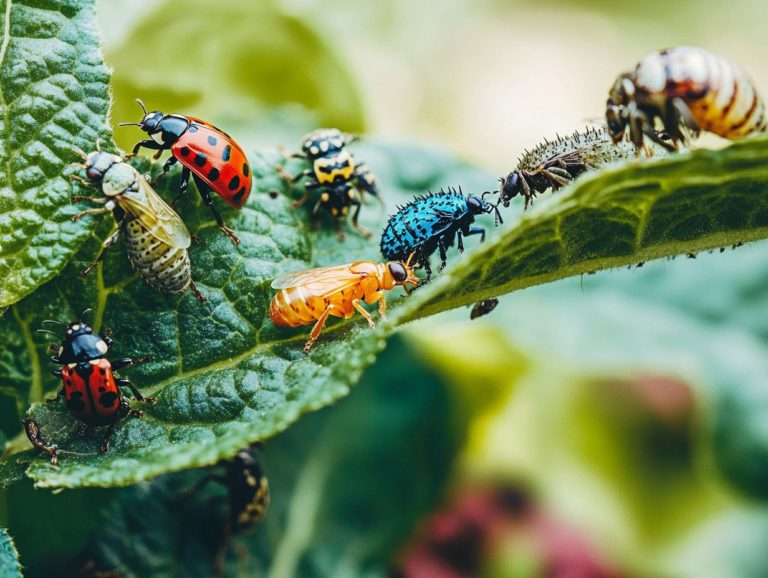How to Use Companion Herbs for Pest Control
Are you seeking a natural approach to enhance your garden’s vitality while effortlessly warding off pests? Companion herbs might just be the answer.
This article explores the many benefits of incorporating these aromatic plants, not merely as culinary treasures but as formidable allies in pest management.
You’ll learn how to select the right herbs, explore their practical applications, and uncover the long-term gains they can offer for a flourishing garden filled with plant diversity.
Unlock the magic of nature and transform your gardening experience!
Contents
- Key Takeaways:
- What are Companion Herbs?
- Benefits of Using Companion Herbs for Pest Control
- Choosing the Right Companion Herbs
- Companion Herbs for Common Garden Pests
- How to Use Companion Herbs for Pest Control
- Maintaining a Healthy Garden with Companion Herbs
- Frequently Asked Questions
- What are companion herbs and how can they be used for pest control?
- Which companion herbs are effective for pest control?
- How can I use companion herbs for pest control in my garden?
- Do companion herbs have any other benefits besides pest control?
- Are companion herbs safe to use for pest control?
- Can I use companion herbs for pest control in a small space or container garden?
Key Takeaways:
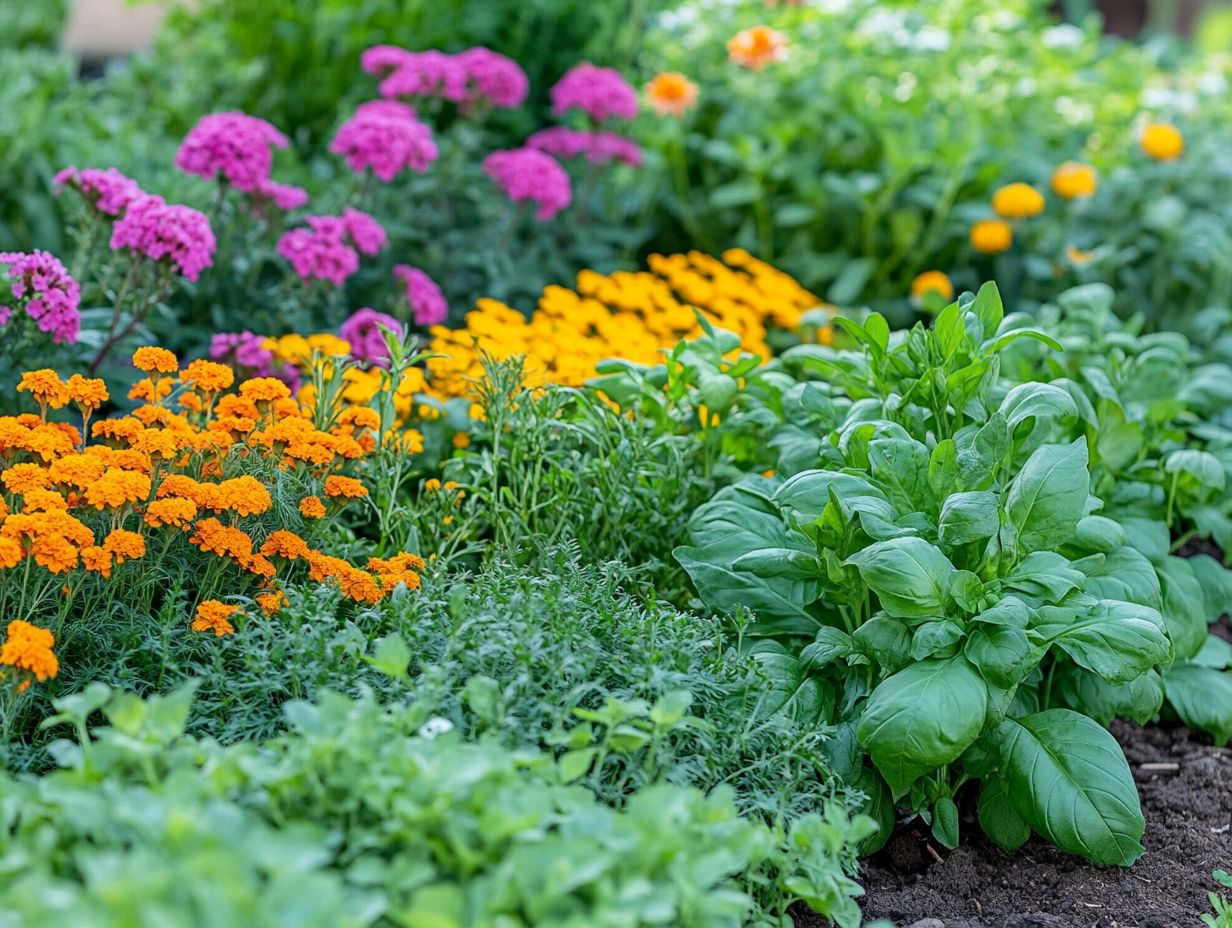
- Using companion herbs for natural pest control promotes a healthier ecosystem for plants and beneficial insects.
- Choose the right herbs based on plant compatibility and the pests you want to control.
- Adding companion herbs to your garden routine can lead to long-term plant health and pest control.
What are Companion Herbs?
Companion herbs are remarkable plants that, when cultivated alongside your vegetables and other flora in a companion planting strategy, offer mutual benefits.
These herbs enhance growth, deter pests, and attract beneficial insects. By incorporating herbs such as Basil, Thyme, and Dill into your organic gardening practices, you can create a stronger and more diverse vegetable garden that flourishes without the need for chemical pest control methods. You can also include trap crops to further manage pests.
Grasping the roles of these herbs can transform your approach to pest management and plant health. This evolution can turn your garden into a thriving ecosystem that nurtures all its inhabitants and supports plant habitats for pollinators.
Benefits of Using Companion Herbs for Pest Control
Utilizing companion herbs for natural pest control presents you with an array of benefits. These include enhancing biodiversity in your garden, providing natural deterrents for common pests, and minimizing reliance on chemical pest control methods by using flowers to deter insects. For more information, check out this guide on how to use companion planting for pest control.
Herbs like garlic, marigolds, and nasturtium serve a dual purpose: they repel harmful insects like squash bugs and attract beneficial insects that bolster a healthy ecosystem.
By strategically incorporating these organic methods through companion plants, you can start cultivating a balanced environment that promotes plant health and resilience against pests while also utilizing herbs that deter pests.
Natural and Safe Alternatives
Natural and safe alternatives to chemical pest control are essential for sustainable gardening. Companion planting in permaculture offers an effective solution by enhancing plant habitats that deter pests while promoting healthy growth.
By embracing organic gardening practices that prioritize these companion herbs, you can create an environment that naturally repels harmful insects and protects the beneficial organisms vital for ecosystem balance.
These natural methods also reduce your dependence on harmful pesticides and encourage biodiversity within your garden. For instance, basil can ward off flies and mosquitoes, while marigolds effectively keep nematodes and other garden pests at bay. Planting mint can also help keep ants away, allowing your other plants to thrive without interference.
Utilizing these companion herbs enhances the growth of neighboring plants and ensures your garden remains a safe haven for pollinators. By adopting such organic solutions, you play a crucial role in preserving a healthy ecosystem while enjoying the benefits of a vibrant, pest-resistant garden.
Enhancing Plant Health and Growth
Companion planting with herbs does more than just keep pests at bay; it significantly boosts plant health and growth and creates a vibrant garden ecosystem that thrives on variety. By thoughtfully pairing herbs like Borage and Cilantro with your vegetables, you can improve how plants absorb nutrients, elevate flavors, and create a nurturing environment that invites beneficial insects.
The interplay among different species encourages a wealth of beneficial microorganisms in the soil. This promotes organic methods and fosters a healthier nutrient cycle. For instance, planting Basil alongside Tomatoes not only deters pests but also enriches both plants with enhanced essential oils and flavors. Adding herbs like Dill with Cabbage can speed up growth rates and increase yields.
This combination creates a rich variety of plants, which is crucial for developing a resilient garden capable of weathering environmental stresses and disease threats. Such collaborative growth patterns highlight the significant impact of natural relationships, showing how they help you cultivate a flourishing garden landscape.
Choosing the Right Companion Herbs
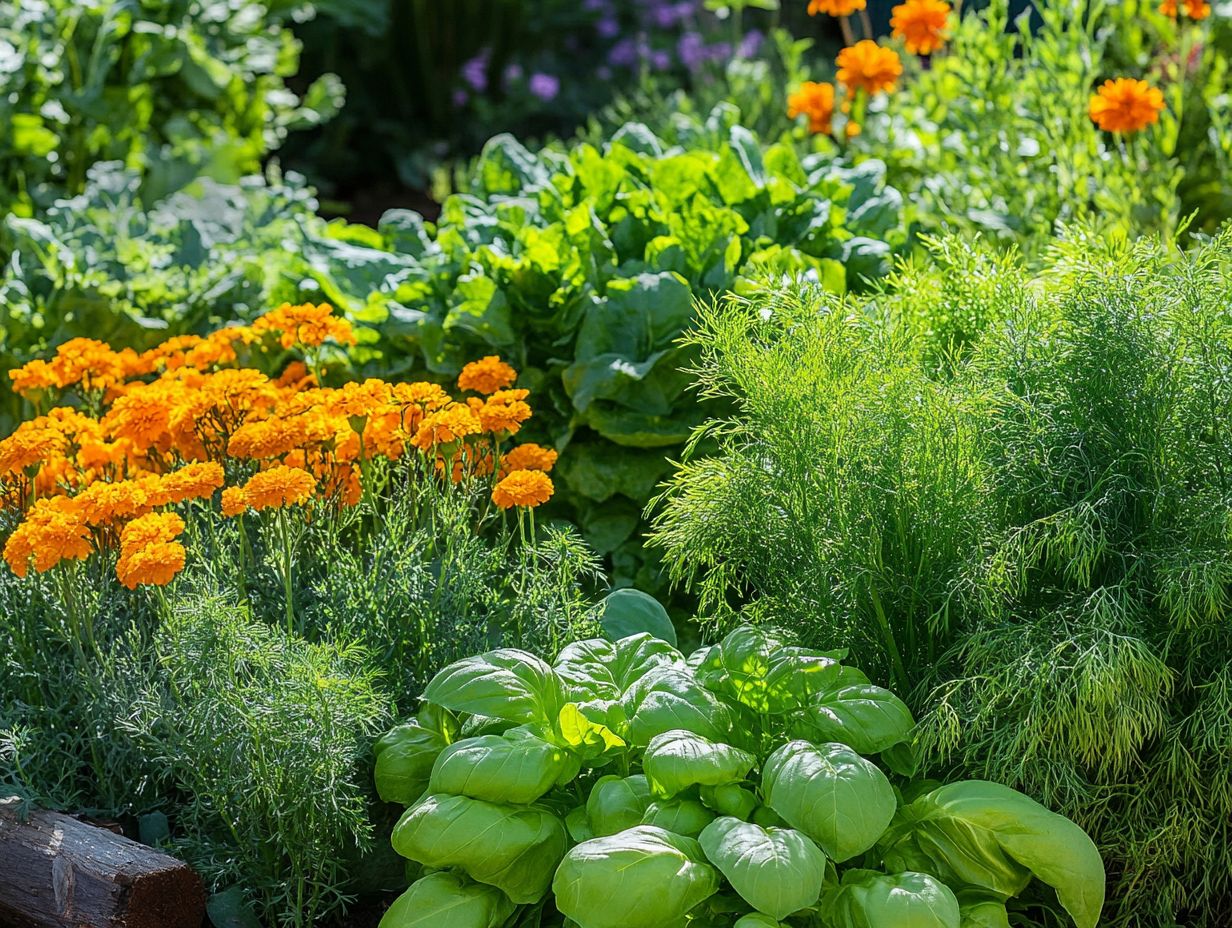
Selecting the right companion herbs is essential for optimizing pest management and improving your vegetable garden’s overall health. Not all plant combinations deliver positive outcomes.
By understanding the unique requirements of your garden such as plant compatibility and the presence of pests you can make informed choices. Herbs like Chives, Catnip, and Tansy naturally ward off unwanted nuisances.
This thoughtful approach fosters a thriving garden ecosystem that promotes gardening without chemicals and ensures the well-being of all its inhabitants, including flowers that attract pollinators.
Factors to Consider
When selecting companion herbs for your garden, consider crucial factors that can significantly impact plant health, pest management, and overall garden success. Key elements include understanding the growth habits of herbs, their compatibility with vegetables, the timing of planting, and the specific pests you aim to deter.
By evaluating these factors, you can ensure your chosen companion herbs effectively enhance your organic gardening efforts. Examine how each herb s growth pattern interacts with neighboring plants; some may outcompete others for nutrients and light.
Compatibility among plants can either boost their growth or hinder it. Certain herbs might release substances that promote or inhibit the development of nearby vegetables.
Timing also plays a critical role. Planting companion herbs at the right moment ensures they establish themselves before your vegetables mature, maximizing their benefits. Researching specific herbs and their pest management abilities can lead to improved garden health, allowing for bountiful harvests while minimizing the need for synthetic chemicals.
Companion Herbs for Common Garden Pests
Companion herbs act as powerful allies in your battle against common garden pests. They leverage their natural properties to bolster your pest control strategies in organic gardening. For example, garlic and marigolds repel pesky intruders like aphids and nematodes. Additionally, exploring the benefits of using companion plants can help you thoughtfully combine them with other plants to create robust defenses against a range of insects threatening your vegetable garden.
By understanding the unique benefits these herbs offer such as their role as flowers that deter insects and herbs that deter pests you can tailor your pest management approach for maximum effectiveness.
Effective Herb Combinations
Using the right herb combinations can boost your pest control strategy and promote healthier plants in your garden while embracing organic gardening principles. For instance, pairing basil with tomatoes not only deters pests but also enhances flavor.
Meanwhile, marigolds alongside your vegetables can attract pollinators and keep nematodes at bay. By understanding which herbs complement each other, you can craft a diverse and effective pest management strategy.
Consider using sage with cabbage for natural protection against cabbage moths, safeguarding your crops. The aromatic presence of rosemary planted next to your beans works wonders in confusing and repelling bean beetles.
These proactive measures do more than just keep pest populations in check; they foster an ecosystem where beneficial insects can thrive.
By implementing these specific pairings, you can reduce your reliance on chemical interventions, promote soil health, and ultimately cultivate a more resilient garden environment.
With thoughtful planning, the right herb alliances can transform your garden into a flourishing landscape.
How to Use Companion Herbs for Pest Control
Incorporate herbs like Catnip and Dill into your planting strategy to create natural barriers. These barriers not only ward off unwanted pests but also attract beneficial insects to bolster your pest management efforts.
Understanding the most effective ways to implement these herbs is crucial for ensuring they promote healthy growth while deterring pests.
Application Methods and Tips
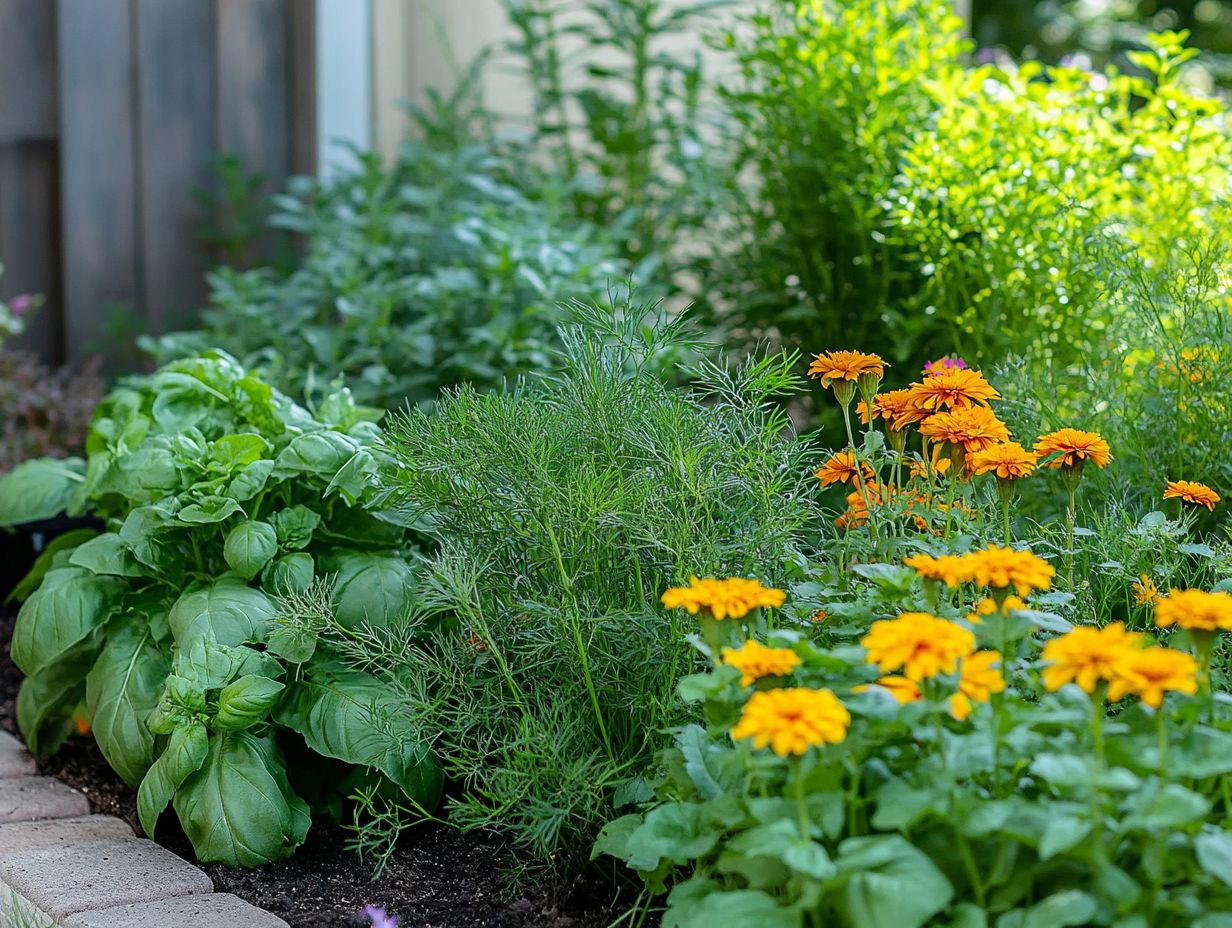
Employing effective application methods for companion herbs is essential for maximizing their impact on pest control. Discovering the best companion plants for pest control enhances overall plant health in your organic garden.
By strategically rotating these herbs alongside your crops, you can create a natural barrier against pests, enriching both biodiversity and yield.
Utilizing aromatic herbs like basil or mint not only attracts beneficial insects but also cleverly masks the scent of plants that might otherwise draw in unwanted pests.
Regularly observing your garden conditions is crucial. For instance, if certain areas become magnets for aphids, relocating those pest-repelling herbs nearby can significantly deter infestations.
Adjusting your watering practices and ensuring each herb thrives alongside its neighbors can further optimize growth. This dynamic approach nurtures a thriving ecosystem, resulting in more robust and healthier plants for you to enjoy.
Maintaining a Healthy Garden with Companion Herbs
Keeping your garden healthy with companion herbs is exciting and rewarding! Your consistent effort and dedication to organic practices enhance plant vitality and resilience against pests over time.
By thoughtfully incorporating herbs such as Tansy and Chrysanthemum into your planting strategy, you actively contribute to an ecosystem that embraces natural pest control.
This holistic approach not only nurtures your plants but also enriches the overall biodiversity of your garden, creating a vibrant and harmonious environment.
Start using these herb combinations today for immediate benefits in your garden!
Long-Term Benefits and Best Practices
Integrating companion herbs into your gardening practices offers many benefits beyond pest control. You ll create a healthy garden environment that supports biodiversity.
Best practices such as crop rotation and consistent monitoring can enhance your garden s sustainability. This approach reduces the need for chemicals and encourages organic gardening principles.
By blending aromatic plants with your primary crops, you create mutually beneficial relationships. These combinations deter pests and improve nutrient availability in the soil.
Regularly updating your companion herb selections with the seasons helps maintain soil health and boosts plant vigor.
A holistic approach emphasizes diverse plant communities. This fosters environmental stewardship and deepens your connection to the land.
Embracing these organic methods leads to a thriving ecosystem that benefits both gardeners and the environment. Start today for a healthier garden!
Frequently Asked Questions
What are companion herbs and how can they be used for pest control?
Companion herbs are plants grown alongside others to provide benefits, such as pest control. They can repel pests, attract beneficial insects, or boost the health of nearby plants.
Which companion herbs are effective for pest control?
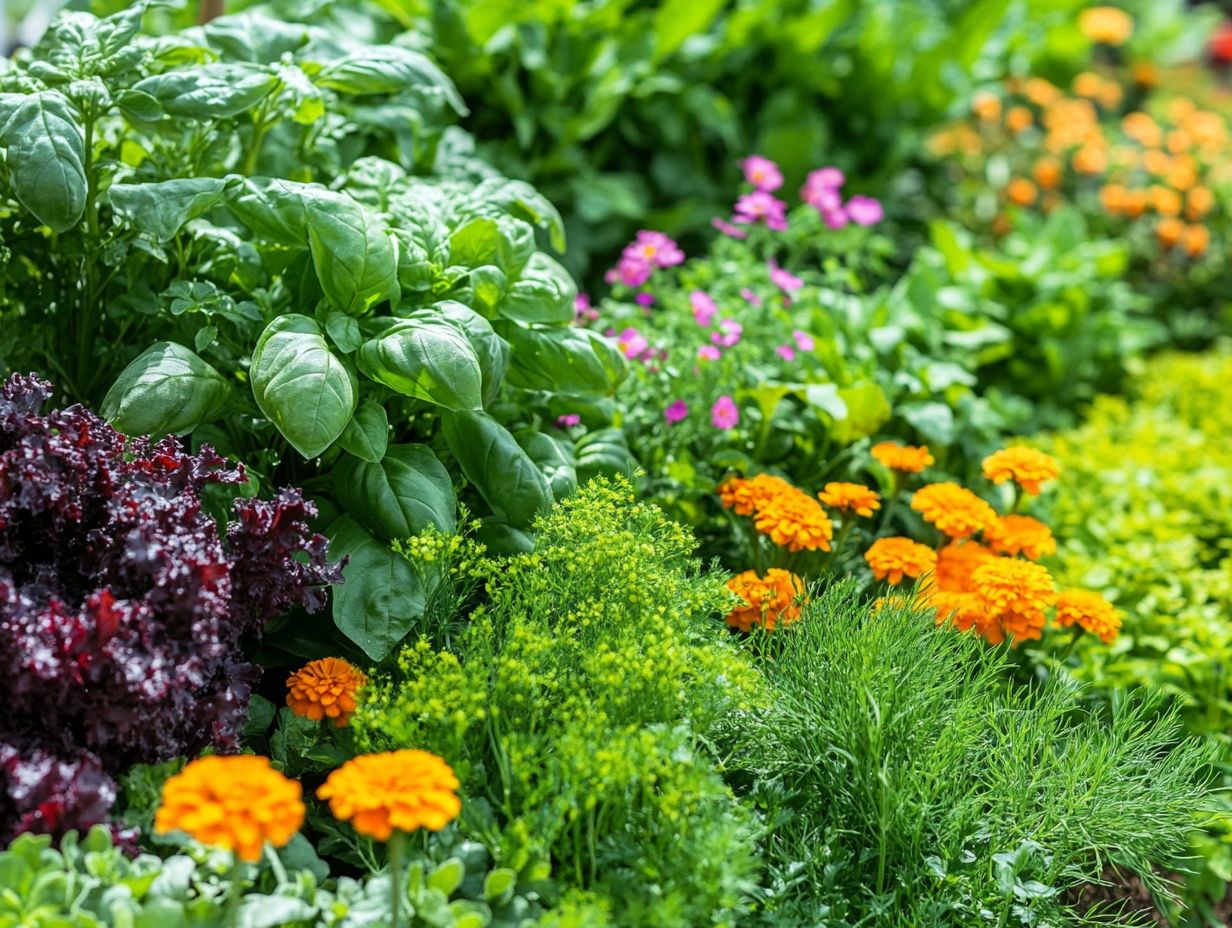
Common companion herbs include basil, rosemary, mint, chives, and lavender. Their strong scents not only repel pests but can also be used effectively in using companion gardening to control aphids and attract helpful insects.
How can I use companion herbs for pest control in my garden?
You can plant companion herbs throughout your garden or in areas with pest issues. Natural pest control sprays can also be made using herbs and water.
Do companion herbs have any other benefits besides pest control?
Yes, they can enhance the flavor and growth of specific plants, attract pollinators, and enrich the soil. They also add visual appeal to your garden.
Are companion herbs safe to use for pest control?
Absolutely! Companion herbs are natural and free from harmful chemicals. Always identify and research them before use.
Can I use companion herbs for pest control in a small space or container garden?
Yes, companion herbs work well in small or container gardens. Choose suitable herbs for your space and plant them accordingly.

